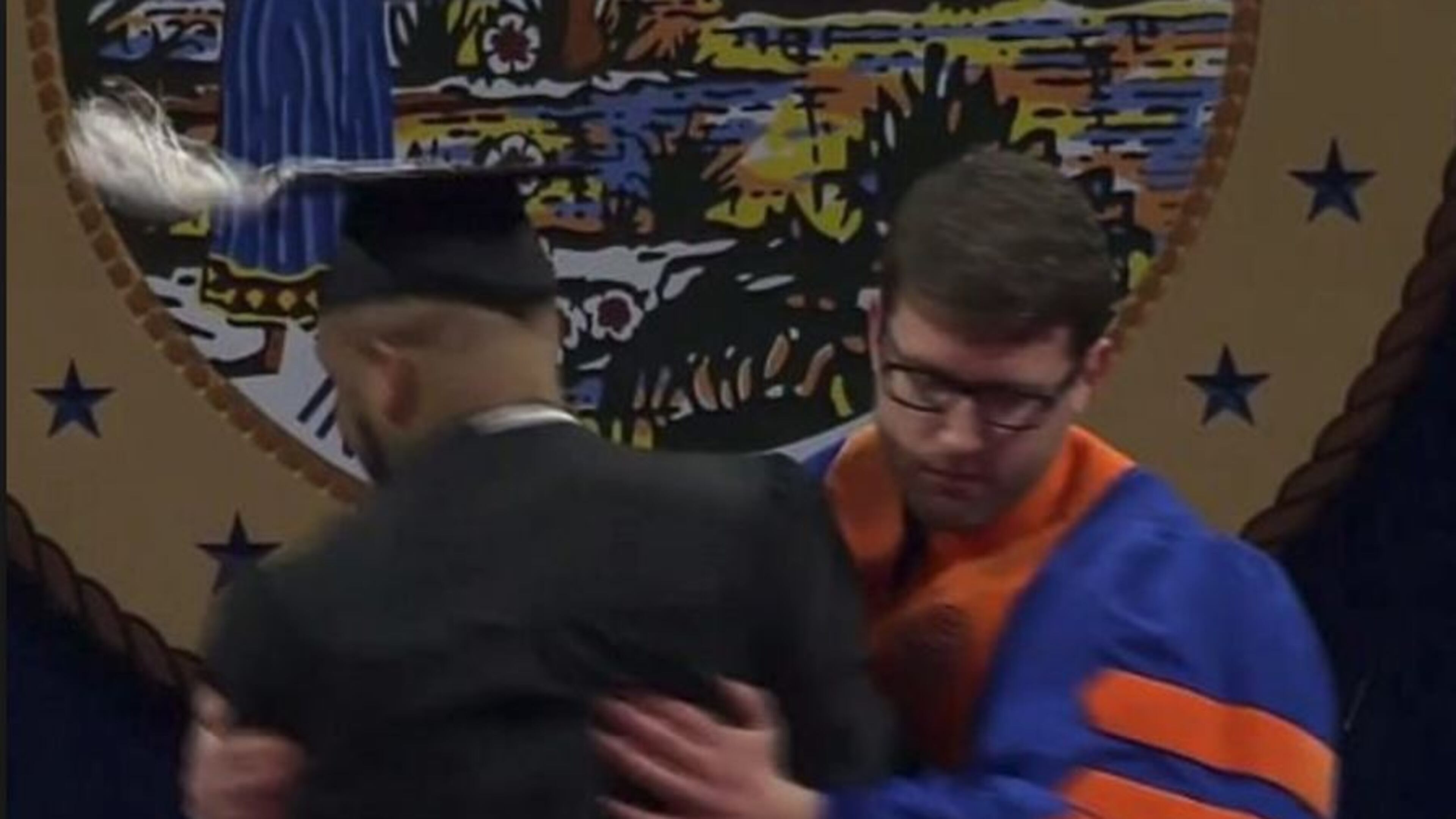Why do we see black students as needing to be controlled?

At the University of Florida graduation Saturday, an overly zealous faculty member, serving as a platform marshal, strong-armed black students who danced up to get their diplomas and rushed them off the stage.
These University of Florida graduates weren't taking any more time to come on stage and get their diplomas; they were just doing it with a bit more flair. The UF president has apologized, but what should have been a celebratory moment turned into an ugly one that has gone viral.
Many students, black and white, add a bit of dash and sass to their short stroll on the stage. As the Alligator, the University of Florida student newspaper, opined in a great editorial:
UF got a black eye over the weekend when black students were aggressively forced out of their strolls while walking during graduation. Strolls, in case you aren't familiar, are traditional, celebratory dances that originated with historically black Greek organizations. They're a lot more meaningful than the usual dabs that we often see.
Nearly everyone in the room caught on that there was something wrong with the moment. In a rare display of unity, the audience maintained solid boos for almost a solid ten seconds. The whole situation was impressively bad. There's no shortage of people calling the students hooligans or insisting that graduation ceremonies are supposed to respectful, classy, decorous or whatever.
Yeah… right. Nothing says "decorous" like parents honking smuggled air horns or holding screaming babies. Nothing says "respectful" like parents sassing one another and bickering over saved seats...Don't let your prejudice pigeonhole you into thinking that only black graduates were strutting their stuff creatively this past weekend. People from all walks of life did their own things while they walked. The reason everyone's angry is because the marshal's harassment of black students was completely out of line compared to how he treated students of other ethnicities (or non-treatment in the case of some students from multiple non-black ethnicities that he inexplicably did not harass.)
The Florida incident reflects a prevalent assumption in education that black youth, boys in particular, need to be controlled.
That point is bolstered by decades of discipline data that show black students get the worse end of it. Yet, we still debate whether there is a bias that sees problems in black students rather than potential.
UCLA researcher Dan Losen explained it to me this way once: When white teachers see a group of white high school students acting up in class or the lunchroom, they see themselves as teens. They see their own kids. That mitigates their reaction. When those teachers see a group of black teens doing the exact same thing, they see a situation they have to tamp down before it goes further.
In the United States, more than 110,000 students experienced corporal punishment in 2013-14. Many were African-American males. But African-American girls are also frequent victims. While 15 percent of the girls in U.S. schools are black, they account for 41 percent of the girls who experience corporal punishment, according to National Women's Law Center. Among the reasons for paddling in recent high-profile cases: dress code violations, tardiness and running in the cafeteria.
The AJC found while black students comprised 37 percent of the 1.7 million Georgia students in the 2012-13 school year, they accounted for 57 percent of students expelled and 67 percent given out-of-school suspensions.
The bias starts early. The U.S. Department of Education discipline reports from preschools found nearly 5,000 preschoolers were suspended once in 2011-2012 and at least 2,500 were suspended more than once. And black preschoolers were more than three times as likely to be suspended than white classmates.
A Yale Child Study Center used eye-tracking technology to examine the role of "implicit bias" in observations of 135 preschool teachers. Asked to watch video of four preschoolers -- a white boy and girl and a black boy and girl -- and identify challenging behaviors, teachers trained their eyes on the black boys, suggesting to the researchers that teachers tend to more closely observe black students when trouble is anticipated, and especially boys. But the children in the video, all of whom were hired performers, displayed no challenging behaviors.
I looked back at the comments on my original story on that Yale study: Among them:
Another liberal white guilt study.
What you refer to as a 'stereotype' is actually factual. Black children are suspended at a disproportional rate because they misbehave at that rate.
We can’t solve this problem if we can’t admit there is one. We have to both accept bias occurs and fight against it.
I am not sure why we resist the stark evidence showing black kids pay a higher price for missteps, starting with dress code violations. The more severe punishments take a toll on their education, with black students losing valuable instructional time to suspensions.
Why not take all the energy spent on denying the problem to fixing it?
Anyone who does not believe minority students suffer from implicit bias has not been paying attention to the larger society. In the last few weeks, we have seen two black men escorted out of a Starbuck's in handcuffs for sitting there waiting for a third party to arrive. We have seen three black teens shopping in a Missouri Nordstrom Rack for prom attire, which they bought and paid for, met outside with police because a store employee felt they were shoplifting. Two Native American brothers were happily touring their dream college when police arrived, removed them from the tour and patted them down – because a white mother felt they looked too different and too creepy and were too quiet.
Let’s talk about this honestly.



